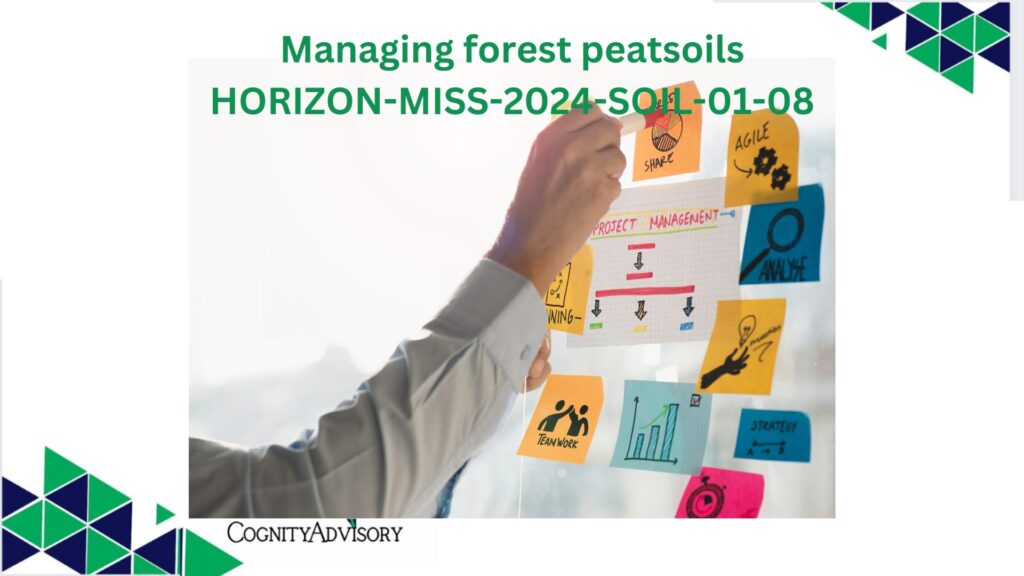HORIZON-MISS-2024-SOIL-01-08
General information
Programme
Horizon Europe (HORIZON)Budget overview
Call
Type of action
HORIZON-RIA HORIZON Research and Innovation Actions
Type of MGA
HORIZON Action Grant Budget-Based [HORIZON-AG]
Open For Submission
Deadline model
single-stage
Opening date
08 May 2024
Deadline date
08 October 2024 17:00:00 Brussels timeTopic description
ExpectedOutcome:
Activities under this topic will contribute to EU climate and nature protection policies and specifically respond to the Mission Soil specific objective 2 “Conserve and increase soil organic carbon stocks “, thereby supporting the implementation of the Land Use, Land Use Change and Forestry (LULUCF) Regulation [1] with respect to the inclusion of wetland restoration activities.
Project results are expected to contribute to all of the following expected outcomes:
- Improved access to knowledge and data on forest peatlands, their management, their role in carbon cycles and societal/economic/environmental values, contributing to the upscaling of carbon farming schemes and their certification under the proposed EU carbon removal certification framework [2].
- Management measures and innovative solutions for sustainable land and forest management are in place at the test locations to maintain and further enhance the status of forest peatlands.
- Forest managers and policymakers in EU Member States and Associated Coun can make better informed decisions on the basis of the assessment of the added value of peatland restoration approaches under different scenarios (different types of forests on peat soils) through enhanced monitoring of their benefits and trade-offs in terms of GHG emissions and removals, climate change adaptation and disaster risk reduction, ecosystem services, and biodiversity.
Scope:
Peatlands can provide multiple ecosystem services such as timber production, climate regulation, water quality control, flood abatement, biodiversity conservation, as well as recreational benefits. However, this potential is compromised due to drainage. Alternative soil management practices for forest peat soils, in particular through the combination of rewetting techniques and forest management (with the exclusion of afforestation), have the potential to improve the environmental, climate and economic performance of peatlands, as well as reduce the impacts of forest harvesting on nutrient, sediment and dissolved organic carbon exports. In particular, practices are needed that effectively address trade-offs from forests multifunctionality and apply an integrated approach to their management (considering biodiversity, climate change challenges, bio-economy needs etc.). This topic does not cover agricultural emissions.
Proposed activities should:
- Establish demonstration(s) of sustainable, climate-positive and biodiversity-relevant forest management on peat soils, including rewetting;
- Assess the benefits of the practices regarding carbon sequestration, while taking into consideration any impacts of forest harvesting on nutrient, sediment and dissolved organic carbon exports from forest peat soils, thus providing information and indicators (such as baseline, quantification method, MRV) of the practices to maximise climate change mitigation and adaptation, biodiversity and other benefits.
- Improve monitoring techniques, including remote-sensing and field-data methods integrating technologies such as AI and robotics, and develop large-scale, minimally invasive GHG measurement facilities on re-wetted sites, to better assess biodiversity and climate aspects of forest management.
- Consider and assess the potential of demonstrated activities to be replicated and scaled up, particularly with a view to developing financial incentives under the EU certification framework, and to this end develop approaches and recommendations for policymakers and land managers.
The project(s) must implement the multi-actor approach and ensure an adequate involvement of the primary production sector and the wider forest-based value chain and all relevant actors (landowners, foresters, scientists, advisors, local/regional/national public authorities, industry, etc.) throughout the different stages of project development and implementation.
Proposals should include a dedicated task and appropriate resources to build on and collaborate with ongoing Horizon projects, notably MRV4SOC, MaRVIC, ALFAwetlands, WET HORIZONS, RESTORE4Cs and REWET and with projects to be supported through topics “HORIZON-CL6-2024-BIODIV-01-8: Conservation and protection of carbon-rich and biodiversity-rich forest ecosystems”, “HORIZON-CL6-2024-CLIMATE-01-2: Socio-economic, climate and environmental aspects of paludiculture”, and “HORIZON-CL6-2024-CLIMATE-01-3: Paludiculture: large-scale demonstration“.
Where relevant, proposals should also build links with projects funded under the Mission “Adaptation to Climate Change”. Potentially, the projects funded under this topic could also cooperate with living labs and lighthouses that will be created in this and future calls of the Mission ‘A Soil Deal for Europe’.
Proposals should demonstrate a route towards open access, longevity, sustainability and interoperability of knowledge/data and outputs, and between existing databases and models, through close collaboration with the Joint Research Centre’s EU Soil Observatory (EUSO), the upcoming EU Forest Observatory and the project SoilWISE. In particular, proposals should ensure that relevant data, maps and information can potentially be available publicly through the EUSO
[1]https://eur-lex.europa.eu/legal-content/EN/TXT/?uri=CELEX:02018R0841-20230511
[2]Commission proposes certification of carbon removals (europa.eu)
